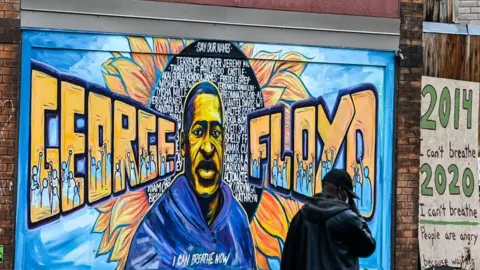Minneapolis to pay George Floyd family $27m
 AFP
AFPThe city of Minneapolis has reached a $27m (£19m) settlement with the family of George Floyd, the unarmed US black man whose death last May sparked protests worldwide.
Mr Floyd's death after being trapped under the knee of police officer Derek Chauvin was captured on camera.
Lawyers for the family said the footage created "undeniable demand for justice and change".
Jury selection for Mr Chauvin's murder trial is currently under way.
Six out of 12 jurors have been selected for hearings beginning on 29 March.
The Minneapolis City Council voted unanimously to approve the pre-trial settlement, the largest ever awarded in the state of Minnesota.
"That the largest pre-trial settlement in a wrongful death case ever would be for the life of a black man sends a powerful message that black lives do matter and police brutality against people of colour must end," said Floyd family attorney Ben Crump.
What led the George Floyd family to sue?
In a video of Mr Floyd's death that went viral on social media, four police officers confront the man for allegedly using a counterfeit $20 bill at a local shop.
They drag him to the ground and Mr Chauvin places his knee on Mr Floyd's neck, even as he begs for his life and says "I can't breathe". He was later pronounced dead in hospital.
Lawyers for the Floyd family filed a civil suit one month later, in June 2020.
They argued the city had been negligent for failing to train officers in proper restraint techniques and for not dismissing officers with a poor track record. Dozens of complaints had previously been filed against Mr Chauvin, who had been serving on the city police force for 19 years.
Speaking after the settlement was announced, Mr Crump said it was but "one step" on the journey to justice. Mr Floyd's death was a catalyst for reckoning on race and bias, he said.
What's the latest on the criminal trial?
The civil settlement comes at the end of the first week in criminal court proceedings over Mr Chauvin's murder trial.
The former officer is facing charges of second and third degree murder and second degree manslaughter. If found guilty on all counts, he could face a maximum sentence of 65 years in prison. He has pleaded not guilty.
Six jurors have been selected for the trial so far.
The final bench will require 12 jurors and four alternates - or substitutes - but suitable jurors have been hard to find in this emotionally charged and high-profile case.
The three other officers involved in Mr Floyd's death - J Alexander Keung, Tou Thao and Thomas Lane - were charged with aiding and abetting murder and manslaughter, and will be tried separately later this year.